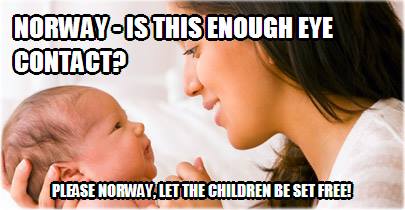Please pray & think of a little infant girl, we will call her ‘M’ – a Norwegian-Slovakian girl who was confiscated in Norway at two months old last year in March. The reason Norway’s CPS gave was because the mother was a foster care child and is deaf and there was lack of eye contact. The parents won the case against barnevernet this year (2016) in March, but Norway’s CPS has appealed and the parent’s precious child is still in foster care. Today, the court proceedings start for the return of their baby, who was unfairly and brutally taken by Norway’s CPS.
Some background information.
In March 2015, the Norwegian Child Protection Service (Barnevernet) in Lillehammer took away a fully breastfed two and a half months old baby girl from a Norwegian-Slovak couple without any obvious reasons. The reason Barnevernet gave at the time in their written statement was a concern about insufficient eye contact between the mother and her daughter; the mother is deaf since she suffered from encephalitis.
Barnevernet also used the fact that the family refused to be moved into a (Horror) Home for Mothers and they also had concerns that the family could go to Slovakia and it would be hard to find them.
The baby was forcibly taken away from the family just one day before ‘M’s’ grandmother was coming to Norway from Slovakia in order to help the family in response to the previously stated concerns of Barnevernet.
The parents are allowed to see their daughter once every two weeks; the meeting place is kept secret and the meetings can last for one hour only. Only once the mother was allowed to breastfeed her baby. The mother though, still tries to keep her breastmilk. Slovakian representatives have already started an intervention in this case.
Dora Boková, lawyer and member of the Petition Committee commented the case.
“This is another outrageous story out of all the cases we have been monitoring through our international network of contacts. As far as we know, the Norwegian authorities have at least tried to search for some serious reasons to support their decisions within the previous cases; only when they failed, they came up with some alternative reasons. However, in this case Barnevernet basically displayed that when they want to take a child away from a family, they just do it. With no obvious reason, the CPS has taken away a healthy, fully breastfed infant from happy parents who could even get support of a grandmother.”
Pavel Hasenkopf added that the family was cooperating with the authorities since the very beginning. He said:
“We have a detailed list of all regular and previously unannounced visits (even night time ones) barnevernet made to the family. Barnevernet started to harass the family with these meetings right after their baby was born, though the family cooperated based on Barnevernet’s instructions.
It was not necessary for anyone to worry about the neonatal jaundice as the little girl was under medical control with regular check-ups and blood tests. The family refused to be moved to a special centre where families are supposed to be observed, because they did not consider the handicap of the mother a reason and because moving to the centre would force the father to commute to work for some hours. However, they arranged for grandmother to come from Slovakia to help the family.
Barnevernet even used her own childhood against the mother as they raised concerns about mother’s mental health based on the fact she was raised in Norwegian foster care since she was three years old. Barnevernet articulated no other reasons.
The Slovak republic has already intervened in the case and asked the Norwegian court to admit Slovakia as an independent party of the litigation in which an appeal against the original Lillehammer court decision will be arbitrated. «I understand the intervention of the Slovak Centre for International Protection of Children and Youths as a specific way of diplomatic protection, despite the fact it is not a diplomatic protection in its strict legal meaning. I can even see this way as more practical,” Hasenkopf added.
